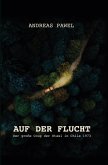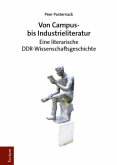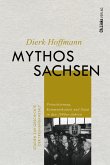Germany, like many countries, has witnessed the rise of extremist far-right groups and parties in recent years, and no more so than in the eastern regions. Why have those parts of Germany that used to be part of the old GDR turned out to be so supportive of extremist groups and parties and such fertile ground for violence and hatred?
To try to find answers to this question, Ines Geipel, the former East German Olympic athlete, returns to her past in order explore the matrix of fear and anxiety that shaped the lives of people in the GDR. Spurred on by conversations at the bedside of her brother as he lay dying of a brain tumour, she probes into her own family background and discovers a web of secrets and denial that reflected larger processes of East German society. She finds that her father had worked as a special agent for the Stasi until the service had no further use for him, and her grandfather had joined the Nazi party in 1933 and was stationed in Riga at a time when tens of thousands of Jews were murdered in the nearby forests. Silence and denial within her family was mirrored in the collective loss of history outside her home, and the repression of ideological non-conformity made it difficult for a traumatized population to grapple with and come to terms with a brutal past. Instead, a politics of forgetting emerged which served the ends of an authoritarian state and seeped into private lives of individuals with deep and lasting consequences.
This powerful memoir, grippingly told, will appeal to anyone interested in the history of modern Germany, in the rise of far-right extremism and xenophobia and in the historical forces that shape the present.
Hinweis: Dieser Artikel kann nur an eine deutsche Lieferadresse ausgeliefert werden.
To try to find answers to this question, Ines Geipel, the former East German Olympic athlete, returns to her past in order explore the matrix of fear and anxiety that shaped the lives of people in the GDR. Spurred on by conversations at the bedside of her brother as he lay dying of a brain tumour, she probes into her own family background and discovers a web of secrets and denial that reflected larger processes of East German society. She finds that her father had worked as a special agent for the Stasi until the service had no further use for him, and her grandfather had joined the Nazi party in 1933 and was stationed in Riga at a time when tens of thousands of Jews were murdered in the nearby forests. Silence and denial within her family was mirrored in the collective loss of history outside her home, and the repression of ideological non-conformity made it difficult for a traumatized population to grapple with and come to terms with a brutal past. Instead, a politics of forgetting emerged which served the ends of an authoritarian state and seeped into private lives of individuals with deep and lasting consequences.
This powerful memoir, grippingly told, will appeal to anyone interested in the history of modern Germany, in the rise of far-right extremism and xenophobia and in the historical forces that shape the present.
Hinweis: Dieser Artikel kann nur an eine deutsche Lieferadresse ausgeliefert werden.
'Ines Geipel takes the occasion of her beloved brother's death to reflect on their times together growing up in the GDR, on the tensions within their family, and on the wider context of east Germany nearly three decades after the collapse of communist rule and unification with the west. Geipel's account of life in GDR is fascinating, and her reflections provide illuminating insights into the inner history and psychological workings of much of what has been going on in eastern Germany over many decades, particularly the impact of dictatorial rule during Nazism and communism, and the changing circumstances since 1989.'
Mary Fulbrook, FBA, author of Reckonings: Legacies of Nazi Persecution and the Quest for Justice
Mary Fulbrook, FBA, author of Reckonings: Legacies of Nazi Persecution and the Quest for Justice








